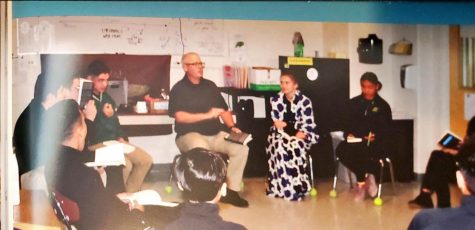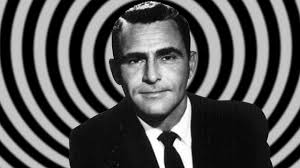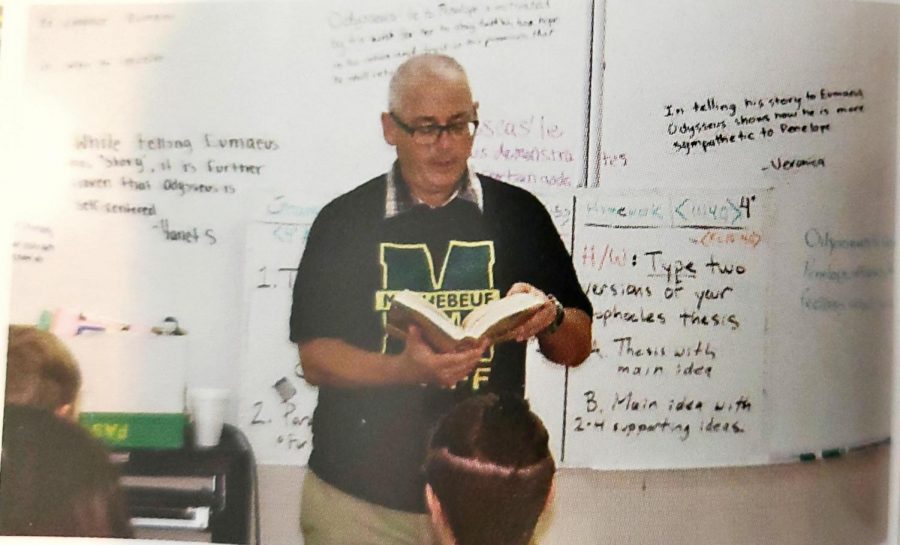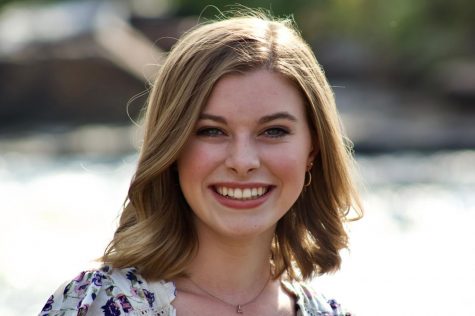Introducing Mr. McGuiness by Mr. McGuiness
October 19, 2020
My name is Matthew McGuiness and I was born in Oakland, California well before that lovely state began to look like the surface of the moon – many moons ago. Ally and I are having this conversation via email because of that rotten rascal called COVID, so if it’s a little awkward or unclear, blame the virus, not us.
My journey to teaching at Holy Family this year goes back deep into the mists of time, so I’ll give the abbreviated version: During the 2019-2020 school year I spent an exhilarating yet exhausting year teaching freshmen Western Civilizations Greatest Hits, including Plato, Plutarch and Homer (not Simpson). The exhaustion came from traversing up and down that infamous goat path called “Eye Two Seventy,” which delivered me to Machebeuf early in the morning and then, snail-like, back to Broomfield every night. I decided I did not want to spend the few dwindling days I have left on earth looking at tail lights and sniffing exhaust fumes.
So I decided I would spend this academic year doing substitute teaching in local schools. But then I saw an announcement from Mr. Hauptly saying that Holy Family was looking for a teacher who could teach multiple subjects. I applied, interviewed, was hired, and here I am: teaching American Government, United States and World History.
I really like this place. The people are all friendly and helpful, I have classrooms with windows, and a really cool retro audio-visual cart customized with speakers and a filing cabinet – virtually a mobile classroom. (A word to my amazing former Nativity students who are now Seniors: you all know that windows cannot be taken for granted! My classroom at Nativity was affectionately called The Bunker because the only “window” was a picture of one painted on the concrete wall.) So besides students, teachers and staff, my next favorite part of the school is our amazing dining facility. I go there for lunch every day. My favorite dish is anything with meat in it. Vicki Burke and the crew do amazing work there, and I’m never disappointed.

For the last 20 years or so I’ve taught philosophy, theology, English and history at public and Catholic schools. What I’ve loved about teaching in Catholic schools is the freedom I have to point out, for example, the religious dimensions of what I’m teaching. Here’s an example:
A couple of years ago I was teaching F. Scott Fitzgerald’s The Great Gatsby. I was really struck by how Jay Gatsby was fascinated by “the green light” that was at the end of Daisy’s dock. The light surely represents Daisy Buchanan, but something more. That “something more” was something I could explore only superficially at a public school. I mean, my goodness, what if I were to assert (claim, state, demand) that that light is not reducible to some impossible love (Daisy) but the source and engine of all Love and every love (namely God)? That is what I thought that green light represented then, and I think the same now. Yet to assert my belief in God in an English class, in a public school, is to invite the wrath of parents and administrators alike who would claim that I’m pushing my religion on the students. In public schools it seems everyone is free to think and say what they want except the teachers. But I say it here at Holy Family, and I am quite free to do so. America! Freedom! Yes! Brothers and sisters, this freedom to say, “Christ” when we see Him is a beautiful thing.

I should like to close by addressing Ally’s question, “Why The Twilight Zone?” Former students of mine from Nativity were exposed to the work of one of my favorite “teachers,” Mr. Rod Serling. He was not only the creator of the original (accept no substitutes!) series (1959-1964), but served as a paratrooper during the Second World War. The show is sometimes seen as simply something weird and dark, but there is in nearly every episode present some drama that illustrates what it means to be human and those difficult choices we must make to stay human – or to refuse to and become something less than fully human.
Here’s a quick summary of one particular episode (spoiler alert): In “Judgment Night” (S1 E10) we meet a passenger on a cargo ship named Karl Lanser. He seems to be suffering from sort of amnesia: he does not know how he arrived on this ship or even who he is or what he does. He dines with some of the passengers and even meets the captain of the ship. Over coffee we (and he) become aware of his great knowledge about German U-Boats (submarines) – their capabilities and tactics. The Captain and First Officer think this odd, so they decide they should check up on this strange man who was born in Frankfurt, Germany. The ship’s steward helps Lanser with his luggage and comes upon a cap. It is an officer’s cap from the German navy. A souvenir, perhaps? We see inside the cap and read: “Karl Lanser, Kapitan Leutnant, Kriegsmarine.” The cap belongs to a U-Boat commander with the same name as this mysterious passenger. Lanser continues to get increasingly worried that the ship is going to be attacked. As night draws on, the ship is suddenly emptied of passengers and Lanser is pinned to the wall by a spotlight from … a German U-Boat. The submarine attacks and sinks the SS Queen of Glasgow.
But this is not the end. Far from it. The final scenes take us back to the U-Boat with Lanser commanding. They have just successfully sunk Queen of Glasgow but one of Lanser’s junior officers expresses misgivings about sinking this ship with innocent civilians aboard. He goes so far as to suggest that for this inhuman act, they might be damned. Lanser scoffs and calls the officer a mystic and a fool. The final scene is of Lanser once again aboard the Glasgow – for all eternity.
In less than 30 minutes, Serling has done something amazing: he has told a strange tale about a strange man in strange circumstances. We see how the man seems to be bound by some kind of fate that seems unfair or unjust. But then we are confronted with the fact that Karl Lanser is not a simple victim, but one who, when he had the chance to do good, did evil instead. This episode brings out themes such as justice, mercy, and judgment. Heavy topics for sure, but also questions that are close to each one of us. Our lives may not often confront us with questions of life and death, but we should ask for the grace to seek what is true, beautiful and good in all of the circumstances we are confronted with.
Fifty years have passed since Serling began his work on The Twilight Zone, but the questions he confronts us with are always relevant because they are questions about what it means to be human. In or out of the classroom.

